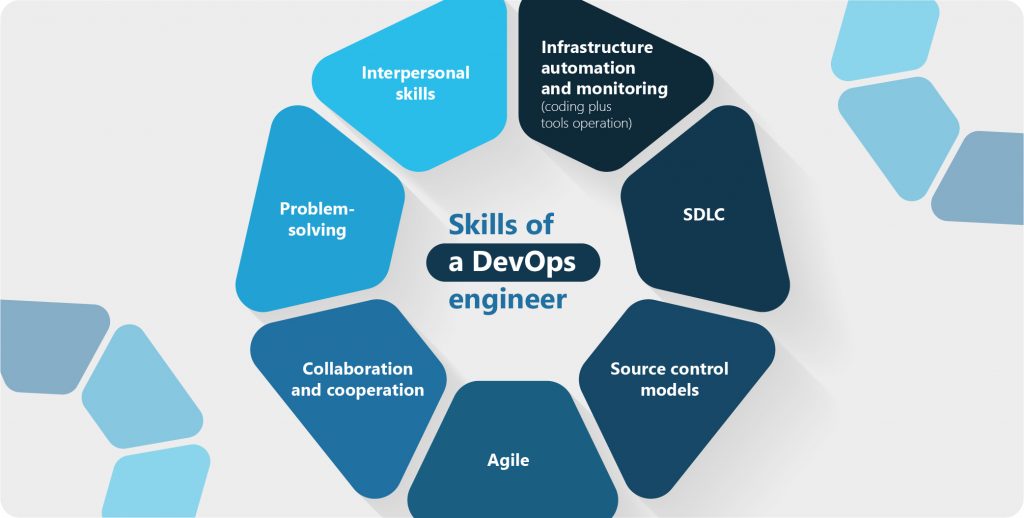While a half IT-world is on the hunt after a decent DevOps engineer, the other half is still guessing what it is and whether they need it. If you belong to the latter category, this article will be like a birthday present for you, as here we talk about what DevOps is, why we need it and, most importantly, what makes a DevOps engineer a great asset to any company.

written by:
Veronica Chizh
While a half IT-world is on the hunt after a decent DevOps engineer, the other half is still guessing what it is and whether they need it. If you belong to the latter category, this article will be like a birthday present for you, as here we talk about what DevOps is, why we need it and, most importantly, what makes a DevOps engineer a great asset to any company.
Have you heard about DevOps and how beneficial it is to any IT-company? Oh, surely, you have, even your 95-year old Granny has. It is so much spoken about, however most of the time in the like manner: it’s so important to be DevOps and if you’re not (why you should is often omitted) – say good bye to the bright future of your business. First thing to understand here is that DevOps is really important, man. “Like gas for your car?” – you may ask. Nowhere near the gas, nor the engine. It is both important and supplementary, more like a T-belt: a detail which won’t come to your mind in the first place if you were asked about the core of the car. However, once the T-belt is broken, the car simply won’t start.
What is DevOps and a DevOps engineer?
So, what is DevOps? The diversity of the means and objectives that any company sets before its DevOps team is immense, along with DevOps implementation examples. It implies that an industry-wide definition of the notion will be a very general one. DevOps is the practice of operations and development engineers participating together in the entire service lifecycle, from design through the development process to production support (The Agile Admin) seems to be OK. Another definition by the same source completes the one from above: “DevOps is also characterized by operations staff making use many of the same techniques as developers for their systems work”. This is actually true. DevOps is the result of the positions merge. Literally, a system administrator plus a developer gives a DevOps engineer.
DevOps engineers rarely start their career as DevOps engineers actually. Most often, they pertain to the developers circle who caught the trick of system administrating or vice versa, used to be system administrators who got the hang of coding. To a certain degree, the success of the DevOps philosophy is due to the synergy of trainings, which enables an individual to see the world from multiple perspectives. Thus, a DevOps engineer helps the developers, testers and IT-teams to soften up product delivery through better infrastructure monitoring, ultimate automation, advanced tooling, and efficient workflows. This enables times faster deployments, reduces human errors, and MTTR, among other perks.
Okay, we’re now clear about what DevOps and a DevOps engineer is and even have slightly covered why we need them. To look into the issue in more detail why many would give their right hand to have such a lifesaver (or a team of them) in their offices, we’ll have to study a DevOps engineer’s JD in more depth. What a DevOps engineer should know?
What makes a DevOps engineer a great asset to your company?
Infrastructure automation and monitoring skills
Many feel confused as regards the mission of the DevOps team and see it in automating everything within a DevOps engineer’s reach. Although this statement isn’t 100% true, automation skills are indeed ranked top in the DevOps Institute’s skills report, “Upskilling: Enterprise DevOps Skills Report 2019.” Infrastructure automation goes closely grouped with infrastructure monitoring, and further branch into server provisioning, configuration management, automated builds, code deployments, and actually monitoring.
As a developer, to deal with the issues from above, a DevOps engineer is able to code and uses at least one scripting language (Java or C#, or PowerShell, depending on the OS of choice). Although a DevOps engineer rarely codes from scratch, he/she possesses basic scripting skills to know the how and why of developers’ things.
As a system administrator, DevOps engineer knows how to operate a bunch of tools to cope with the infrastructure-related tasks. Among such DevOps names Ansible, Chef, Puppet, Jenkins, Docker, New Relic, Sensu along with other great tools (listed in the above article, broken by categories) that are typically used in the DevOps environment. Not bad for one employee, hmmm?
Process skills
Although automation skills rule, “automation without process expertise… is all but useless”, state the same reporters. That’s why a successful DevOps engineer has profound knowledge of the entire workflow within a given company to be able to make processes more efficient and fluent (as this is what we need DevOps for). In this connection, understanding of SDLC, experience working with source control models and processes, Agile methodologies add up to the DevOps engineer skills list. These may seem a way too simple for you compared to the infrastructure-management skills. Nevertheless, it is exactly what helps DevOps guys “to strategize the entire integration and deployment process” (IntelliPaat). Without the correct workflow, an enterprise stumbles into organizational issues that all too often are attempted to resolve using technical means, which is completely incorrect. If DevOps engineers are system administrators and masters of processes, human (a.k.a. process)-related issues won’t be an issue for the company whatsoever.
Soft skills
This type of skills was also highlighted in the Upskilling: Enterprise DevOps Skills Report. The authors name collaboration and cooperation, problem-solving, interpersonal skills, and many more, with risk-taking wrapping up the list. Which, actually, points to the fact, that a DevOps engineer is a brilliant team-player. This quality is often not so essential in case of a developer. On the contrary, it is urgent in the DevOps universe, judging by the number of individuals and teams that a DevOps engineer has to interact on a daily basis.
In its turn, Qulix Systems distinguishes the following soft skills expected from a DevOps candidate:
- Strive for constant perfection and thirst for the new;
- Curiosity, inner drive to get to the bottom, enthusiasm;
- Strong work ethic and time management skills;
- Openness and teamwork skills.
A Recap
As a developer, a DevOps engineer should be able to develop new, and upgrade and fix the existing software. As a system administrator, he/she needs to master various tools and technologies to automate, configure and monitor operating environments. Finally, as a team-player who’s regularly in touch with different people, a DevOps engineer must demonstrate impeccable soft skills. Seems like a DevOps engineer is Jack of all trades and, surprisingly, master of all. What it actually gives to an enterprise, in figures? It is 200 times more frequent deployments, 24 times faster recovery, and 3 times lower change failure rates, according to the “State of DevOps Report” by Puppet.
In short, the era of speedy delivery, efficient troubleshooting and spectacular networking is synonymous to the era of DevOps. Is there a flipside of this success story? Well, it’s $100,000 in salary, which lands DevOps engineers on top of almost every Highest paying tech jobs list.
Well, if your company already has DevOps department up and running, surely you’ve seen the mesmerizing effect of them in action. If you are yet to try this IT weapon out, don’t wait too long and surely don’t be thrown off by the numbers in the above paragraph. Given that the global IT industry is about to reach $5 trillion in 2019, it’s a reasonable, if not a modest price to pay.
Badly need DevOps team on and running but have no idea where to start? We have extensive expertise on the matter and will be happy to share it with you. For more information, contact us at request@qulix.com or visit us here.

Contacts
Feel free to get in touch with us! Use this contact form for an ASAP response.
Call us at +44 151 528 8015
E-mail us at request@qulix.com






